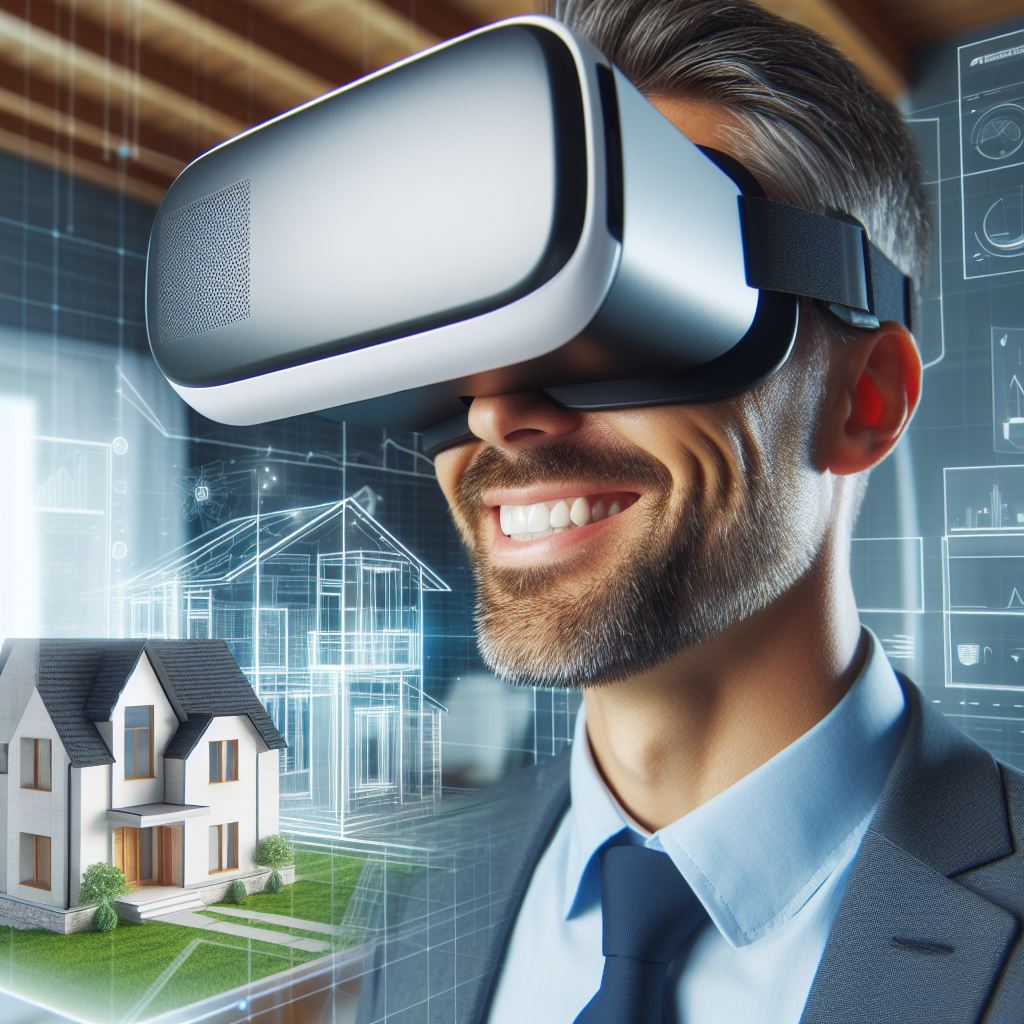Introduction
Importance of technology in commercial real estate growth
Technology has become an integral part of the commercial real estate industry, revolutionizing the way properties are developed, managed, and marketed.
In today’s digital era, technology-driven innovations have become essential for driving growth, enhancing efficiency, and staying competitive.
The use of advanced software solutions and data analytics allows commercial real estate professionals to streamline processes, make informed decisions, and optimize property performance.
Emerging technologies like virtual reality and augmented reality are transforming the way properties are showcased and experienced by potential customers, leading to increased marketability and faster sales cycles.
Moreover, technology enables automation of various tasks, saving time and reducing human errors.
Computer-aided design (CAD) software facilitates efficient planning and design, while smart building systems enable remote monitoring and control of building operations, ensuring optimal energy usage and occupant comfort.
In addition, technology drives enhanced connectivity and collaboration within the industry.
Online platforms and marketplaces provide access to a vast network of potential buyers, sellers, and investors, expanding market reach and facilitating deal-making.
Real estate professionals can now leverage social media and digital marketing strategies to effectively target audiences and generate leads.
Overall, technology empowers commercial real estate professionals to adapt to changing market dynamics, make data-driven decisions, and deliver superior customer experiences.
This section will delve into these main points, emphasizing the significance of technology in driving growth and achieving success in the commercial real estate industry.
Role of Technology in Commercial Real Estate
How technology has transformed the industry
Technology has revolutionized the commercial real estate sector, bringing about significant changes in various aspects of the industry.
The integration of digital tools and platforms has greatly transformed the way business is conducted, leading to increased efficiency, transparency, and data-driven decision-making processes.
Benefits technology brings to commercial real estate growth
1. Improved communication and collaboration among stakeholders
Technology has improved communication channels by providing platforms for real-time conversations and information sharing.
Stakeholders like developers, investors, brokers, and tenants can now connect seamlessly, leading to enhanced collaboration and faster decision-making.
With the use of digital communication tools, such as video conferencing and project management software, stakeholders can work together regardless of their physical location, reducing delays and increasing productivity.
2. Enhanced property management and operations
Technology has transformed property management and operations by automating various tasks and processes.
Facility management software allows property owners to efficiently manage maintenance requests, track work orders, and monitor energy consumption.
With the growing popularity of Internet of Things (IoT), properties can be equipped with smart sensors and connected devices to collect real-time data on building systems, enabling proactive maintenance and better resource allocation.
3. Streamlined leasing and transaction processes
Technology has significantly improved leasing and transaction processes in commercial real estate.
Online platforms and databases have simplified property searches, allowing potential tenants and buyers to access a wide range of listings with detailed information, including virtual tours and floor plans.
Electronic signatures and digital documentation have made lease agreements and transactions faster and more convenient, eliminating the need for physical paperwork.
This streamlining of processes reduces administrative burdens and expedites deal closures.
In essence, technology has played a vital role in transforming the commercial real estate industry, resulting in increased efficiency and growth.
Improved communication and collaboration among stakeholders, enhanced property management, and streamlined leasing and transaction processes are just a few of the many benefits brought about by technology in this sector.
As technology continues to advance, the industry is bound to witness further developments and improvements, creating new opportunities and challenges for stakeholders in the commercial real estate market.
Read: Drone Photography: Changing Real Estate
Tech Tools for Commercial Real Estate Growth
Various technology solutions used in the industry
Technology has revolutionized the commercial real estate industry, enabling growth and innovation like never before.
From virtual reality and augmented reality to AI-driven analytics and smart building systems, these tools are transforming the way business is done.
A detailed exploration of key tech tools impacting commercial real estate growth
Virtual reality and augmented reality in property visualization and marketing
These technologies allow potential buyers or tenants to virtually tour and experience properties, saving time and resources in the process.
With the help of VR and AR, real estate professionals can showcase properties remotely, attracting a wider range of clients.
AI-driven analytics and predictive modeling for market insights
AI algorithms analyze vast amounts of data to provide valuable insights into market trends, property performance, and investment opportunities.
This technology allows CRE professionals to make data-driven decisions, reducing risks and maximizing returns.
Smart building systems for efficient operations and sustainability
Smart building technology incorporates IoT devices and sensors to monitor and control various building systems, such as lighting, HVAC, and security.
These systems optimize energy usage, reduce operational costs, and enhance overall sustainability.
Internet of Things (IoT) in optimizing tenant experience and security
IoT devices, such as smart locks and occupancy sensors, enhance tenant experience by offering seamless access and personalized amenities.
Additionally, IoT-based security systems provide advanced monitoring and proactive threat detection, ensuring a safer environment for occupants.
These tech tools have the potential to revolutionize commercial real estate growth by improving efficiency, enhancing decision-making processes, and creating a better tenant experience.
Embracing these technologies can give businesses a competitive edge in the market.
The integration of technology in commercial real estate has significantly impacted the industry’s growth trajectory.
Virtual reality and augmented reality enable immersive property experiences, while AI-driven analytics provide valuable market insights.
Smart building systems enhance operations and sustainability, and IoT devices optimize tenant experience and security.
Real estate professionals must stay updated with the latest tech tools to remain competitive and capitalize on new opportunities.
By embracing these advancements, businesses can unlock new growth potentials and drive success in the rapidly evolving commercial real estate landscape.
Read: Smart Homes: Future of Real Estate Tech
Case Studies and Success Stories
Examination of real-life examples where technology-enabled commercial real estate growth
In today’s fast-paced world, commercial real estate industry is increasingly relying on technology to drive growth and success.
Let’s examine some real-life examples where innovative tech tools have played a pivotal role in transforming the industry.
Showcase of companies and projects that successfully leverage tech tools
1. Case study of a smart building project with increased tenant satisfaction and reduced costs
One remarkable example of technology-enabled growth in commercial real estate is the implementation of smart building projects.
These projects leverage various tech tools to enhance efficiency, improve tenant satisfaction, and reduce operating costs.
For instance, a leading real estate development company implemented a smart building project in one of their commercial properties.
They integrated advanced sensors and automation systems to monitor and optimize energy consumption, lighting, and security in real-time.
As a result, the company achieved significant energy savings, leading to reduced operational costs.
Additionally, the smart building technology allowed tenants to personalize their working environment, resulting in increased satisfaction and productivity.
This case study showcases the transformative power of technology in driving commercial real estate growth.
2. Success story of a real estate company utilizing AI-driven analytics to make informed investment decisions
Another notable success story within the commercial real estate industry involves the utilization of AI-driven analytics.
A leading real estate investment firm leveraged advanced artificial intelligence to make informed investment decisions, resulting in substantial growth and profitability.
By employing sophisticated algorithms and machine learning, the company was able to analyze vast amounts of data, including market trends, property performance, and economic indicators.
This enabled them to identify lucrative investment opportunities and gain a competitive edge in the market.
The benefits of AI-driven analytics are multifold. It allows real estate companies to make data-driven decisions, providing them with a holistic view of market dynamics and enabling them to mitigate risks effectively.
This success story highlights the importance of technology in driving growth and success in commercial real estate.
In general, the examination of real-life case studies and success stories in commercial real estate reveals the significant impact of technology on industry growth.
From smart building projects to AI-driven analytics, innovative tech tools have revolutionized the way commercial real estate operates.
These examples serve as inspiration for industry professionals to embrace technology and leverage its power to drive future growth and success.
The future of commercial real estate lies in the hands of those who dare to integrate technology into their strategies and adapt to the evolving landscape.
Read: AI in Real Estate: Trends and Predictions

Overcoming Challenges and Future Trends
Challenges and barriers faced in adopting and implementing technology in commercial real estate
Technology has the potential to revolutionize the commercial real estate industry, but it also presents its fair share of challenges and barriers.
As the industry continues to evolve, it is important to address these obstacles to ensure a smooth transition towards technological advancements.
One of the main challenges faced in adopting and implementing technology in commercial real estate is resistance to change.
Many industry professionals are accustomed to traditional methods and may be hesitant to embrace new technologies.
Overcoming this resistance requires careful education and demonstration of the benefits that technology can bring, such as increased productivity and cost savings.
Another challenge is the high cost of implementing new technologies. Commercial real estate companies often have tight budgets, and investing in technology can be seen as a luxury rather than a necessity.
However, failing to adapt to technological advancements can put a company at a competitive disadvantage in the long run.
To overcome this challenge, companies can start by implementing cost-effective solutions or partnering with technology providers to share the financial burden.
Data security and privacy concerns are also significant barriers in technology adoption.
Commercial real estate deals involve large sums of money and sensitive information, making cybersecurity a top priority.
Integrating blockchain technology can address these concerns by providing a secure and transparent platform for transactions.
Blockchain eliminates the need for intermediaries and creates a decentralized ledger that is resistant to tampering and fraud.
Furthermore, the complexity of integrating different software systems poses a challenge for many commercial real estate companies.
There is often a lack of interoperability between various applications, leading to inefficiencies and data discrepancies.
Investing in integrated technology solutions can help streamline processes and improve data accuracy and consistency.
Exploration of future trends and advancements in tech for continued growth
Despite the challenges, the future of technology in commercial real estate looks promising.
Emerging trends and advancements continue to revolutionize the industry, offering new opportunities for growth and efficiency.
1. Integration of blockchain technology for secure and transparent transactions
Blockchain technology has the potential to transform the way commercial real estate deals are conducted. Its decentralized nature ensures transaction transparency, enhances trust, and reduces the risk of fraud.
Smart contracts powered by blockchain can automate and streamline the transaction process while maintaining accuracy and integrity.
2. Advancements in machine learning and automation for efficient property management
Machine learning algorithms can analyze large data sets and provide valuable insights for property management.
Predictive analytics can help optimize rental rates, identify potential maintenance issues, and improve energy efficiency.
Automation tools can streamline routine tasks such as lease administration, rent collection, and accounting, freeing up time for more strategic decision-making.
3. Virtual and augmented reality for enhanced property marketing and viewing
Virtual and augmented reality technologies are transforming the way properties are marketed and viewed.
Prospective tenants and buyers can now take virtual tours of properties from anywhere in the world, saving time and money.
These technologies offer a more immersive experience, allowing users to visualize the property’s potential and make informed decisions.
4. Internet of Things (IoT) for smart building management
The IoT enables connectivity and communication between various devices, allowing for centralized control and management of building systems.
Connected sensors and devices can monitor and optimize energy consumption, improve maintenance processes, and enhance occupant comfort.
Smart buildings reduce operational costs and create a more sustainable and efficient environment.
In a nutshell, while there are challenges and barriers to adopting and implementing technology in commercial real estate, the industry must embrace these advancements to stay competitive.
Overcoming resistance to change, addressing cost concerns, ensuring data security, and improving software integration are crucial steps in the journey towards digital transformation.
The integration of blockchain, advancements in machine learning and automation, virtual and augmented reality, and the Internet of Things present exciting opportunities for continued growth and efficiency in the industry.
By embracing these future trends, commercial real estate companies can unlock their true potential and thrive in the era of technology.
Read: Blockchain’s Role in Real Estate Transactions
Find Out More: Augmented Reality in Property Viewing
Conclusion
Main Points
Summarizing the key discussion: Technological integration streamlines operations, elevates data analytics, and amplifies market intelligence in CRE.
Emphasis on Technology’s Role
Emphasizing its pivotal significance: Technology stands as the driving force propelling unprecedented growth in commercial real estate.
Final Thoughts on Potential
Contemplating the industry’s horizon: Technology holds the immense potential to revolutionize CRE, heralding an era of innovation and transformation.
Its impact on reshaping how transactions occur, how data is analyzed, and how businesses operate within the commercial real estate sector is poised to redefine the industry’s landscape significantly.




